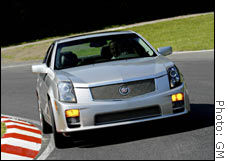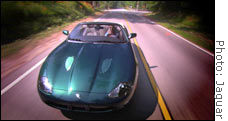NEW YORK (Money Magazine) -
After years of testing Electronic Stability Control (ESC) systems -- from icy test tracks to real-world rainstorms -- I believe stability control is far more likely to save your life than any air bag. Automakers should offer it on every car and truck, at a reasonable cost. And consumers should demand it.
If you don't know what ESC is, and many car buyers don't, read my story to find out why I think these systems are absolutely vital.
So which cars give you stability control? If you're buying a pricey sports car, luxury car or SUV, chances are good that an ESC system is either standard or optional.
Acura, Audi, BMW, Cadillac, Infiniti, Jaguar, Lexus, Mercedes and Saab have made it standard on all or most of their models.
 |
|
| Cadillac CTS comes with Stabilitrak as standard equipment. |
Among lower-priced brands, Volkswagen leads the way, offering what it calls its Electronic Stabilization Program (ESP) on its entire lineup, either standard or as a $280 option. That makes it among the most affordable, since ESC systems typically range from $400 to $1,100 as stand-alone options.
When it comes to U.S. automakers, Chrysler trails the pack badly: It offers the safety feature on just one model, the Crossfire sports car.
The problem, says Bill Kozyra, CEO of Continental Teves North America, a leading stability-control manufacturer, is that too many consumers don't know the systems exist or how well they work.
Manufacturers, under enormous pressure to keep prices competitive, are loath to add expensive standard equipment that consumers aren't clamoring for. "Personally, I would like to see it on all cars, but it's hard [for many automakers] to justify on lower-priced models" due to costs, says Fred Heiler, a Mercedes spokesman.
 |
|
| Jaguar's Dynamic Stability Control comes standard on the XKR |
Instead, automakers make it optional equipment. Unfortunately, they often "bundle" systems with other extra-cost features in a package that makes the price of entry even steeper. As a result, only six in 100 new cars leave dealerships equipped with an ESC system today. And that's discouraged automakers all the more.
Take the Ford Focus. Starting at $13,270, the popular compact was the most affordable car to offer a stability-control system. But when only 2 percent of buyers anted up $1,200 for the admittedly pricey system last year, Ford decided to drop it on 2004 models.
| More on car safety tech:
|

|
|
|
|
Despite the potential of ESCs to prevent rollovers, it's been a hard sell even to Ford's SUV buyers -- a group one might have expected to embrace it following the public anxiety over the Explorer and Firestone rollover scandal. The company offers its system, called AdvanceTrac, as an option on the Explorer, the nation's best-selling SUV.
But the $795 package includes features you may not want, like a towing package. You're also forced to shell out an additional $120 for adjustable pedals, designed to benefit shorter drivers. So whether it's cost, lack of knowledge or plain indifference, only 3 percent of Explorer buyers have opted for AdvanceTrac.
I can't blame a cash-strapped consumer for passing on yet another expensive option. But I've little patience with people who talk a good game about auto safety and then blithely skip stability control in favor of frippery like heated seats or a fancy audio system.
Click here to see all the cars that offer ESC.

|

